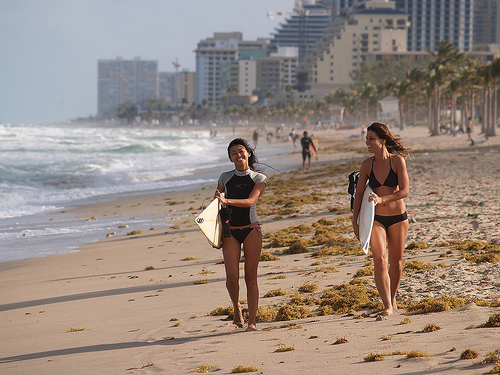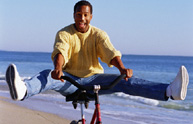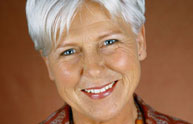82: Health equals wealth
09-02-2006
Introduction
The objective of this special report is to help you improve your health and in doing so, improve your happiness and the quality of your life. Healthy in mind and body will improve your wealth and success in property investing. With good health – your investing will be severely hindered. The following elements are key to a happy and successful life:
- Health
- Quality of life
- Safety of you and your family
- Mental health
- Job satisfaction
- Wealth and financial freedom
This extended special report aims to give guidance and advice on how to make your life more enjoyable and find truly high quality of life and self-fulfilment. Much of the advice given is challenging, can be counter-intuitive and sometimes based on loose correlations and trends. Whilst much of the advice cannot be substantiated with 100% proof, we hope it will provide you with insights and raise questions about how best to manage your life, so you can lead a fruitful, productive and happy lifestyle.


Health
Top priority is your health, and the health of your immediate family. This is more important than money, investing or wealth. Without it you will likely not become wealthy or have success in investing. On this basis, this section, the first section, is probably the most important for you. Without good health, little or nothing else can follow. We all want a sustainable happy life, and it starts with good health. We are living for ever longer through advance in medicine, technology and health and this is likely to continue. We need to take steps early so we can enjoy our later years without illness, disability and early cessation of life. If you implement the simple steps outline below, our chances of enjoying your latter years will improve tremendously. I personally would like to be cycling around the countryside and active when I am 70+ years old – I do not want to be in a wheelchair or have a weak heart – and I would like to see my grandchildren – these are two motivations behind my adoption of the following advice.
Exercise
Exercise is essential to stay fit, healthy and help with ones feeling of well-being. Make sure you find the type of exercise you enjoy – this is critical to maintaining a routine for regular exercise. If you enjoy walking, then walk – if you enjoy cycling, then cycle. Try and build exercise into your day and get it into a routine – in doing so, it will become mildly addictive and will really help you stay healthy. It’s not as effective to exercise off and on, much better to take regular exercise. Exercise builds strength in your cardio-vascular system, builds muscle mass and maintains muscle tone. Since muscle burns many more calories than fat, even at rest, you might have the pleasant experience of loosing weight despite eating the same amount of food. You’ll even be loosing eight while you sleep!
 Sleep
Sleep
In today’s world of ever increasing complexity, work pressures and multi-tasking, lack of sleep creates added pressures on ones well-being, motivation and ability to press ahead and perform to full potential. Most people assume they need eight hours sleep without really stopping to think about their sleeping patterns. Sleep is 50% a psychological response to feeling de-motivated and de-energised. This occurs when the adrenaline and endocrine response is at low levels caused by inactivity or lack of stimulation. Whilst the body occasionally needs a real “breather”, it does not need nine or ten hours sleep a day. Try to get a least six good hours sleep a day, with two ten-minute naps at say 2pm and 7pm each day. Make sure these are only 10 to 15 minutes – just enough to drift away and then come back out of your snooze in a controlled fashion. Get yourself comfortable and think about something pleasant – take deep slow breaths and you will start drifting off. Feel yourself going into a sleep then slowly coming back out again after ten minutes. Imagine you are actually breathing or ventilated through your chest – focus on your chest movements (this has the affect of releasing stress in your head). Set a timer for 12 minutes. Any longer than 15 minutes and one can drift into a deep sleep that you will find it difficult to break out of – this can affect your daily sleeping pattern and make your normal sleep too light and fragmented. Have six hours sleep with two ten minute naps can gain you two hours of time a day, and you will feel better during your waking hours, since you will have gone for only a maximum of 7 hours with some form or rest. Just think of that, you can look forward to a beak after 7 hours instead of 17! I would maintain that going fast for 17 hours is not healthy, natural or normal. Pretty sure we never did this when we were hunters or farmers. Animals don’t do this either, so we do we? Social and corporate conditioning and working hours from the industrial era dictated no snoozes during the day – you need to break this mould. But if you work in an office, if you snooze in front for your colleagues or boss, they’ll get an incorrect impression you are lazy – so you need to find a quite place where you can “duck out” – and not been seen. Get 10 minutes snooze whenever you can. An example is, if you have a taxi ride that you know takes 10 minutes at a suitable time in the day, take you nap (instead of chatting to the taxi driver). If you take a train, the same applies – take 10 minute snoozes once or twice a day, and you’ll find you can manage with say 6 hours instead of 8 hours sleep!
Excessive Weight
Excessive weight is not good for your health. Recent research has pointed to the fact that people who are 25% in weight than the average can live 25% longer than the average – this is startling. There is good weight and bad weight – good weight is when a body carries high muscle mass and bone mass, with lower excess fat. Bad weight is low muscle mass, low bone mass and high fat mass. People who are tall with big bones are normally heavier than those who are small with light frames. There are tables that can be used to gauge whether you are overweight against your build and height. So why is it that heavy people do not live as long? Most probably because the excessive weight and lower strength puts stress and pressure on the body. Just imagine having to carry a 10 kg weight (or 9 packets of sugar) around with you all day – this is not far removed from being 10 kg overweight. Eventually pressure is exerted on the cardio-vascular system and bones. Arthritis is more common, as is diabetes. Excess weight leads to difficulty moving around in older age and problems with joints. This will lessen your ability to stay fit with old age. Less opportunity to enjoy your later years. In summary, you owe it to yourself and your family to stay in reasonable shape and weight. There are many weight loss remedies, but the one we outline below is a natural one, with no pills to assist.
Exercise makes you feel good – it is clinically proven that exercise releases endorphins which create a “feel good” factor. This will make you more relaxed, easier to make laugh an lead to better focus and concentration. It relieves stress. We recommend a good 20-30 minute walk, jog or cycle every day.
 Exercise and how to lose weight
Exercise and how to lose weight
In essence, it’s best to build exercise into your lifestyle and cut down on excessive food intake.
- Walk or cycle to work
- Go for a walk and jog during your lunch break
- Take up a sport with friends
- Make sure you do exercise you enjoy – do not overdo it since this might turn you off the idea of exercise
- Walk as much as you can – quick walking is better than slow walking
- Use dumb bell weights to build muscles while you watch TV or read a book (discussed below).
The main reason exercise helps to lose weight is not through the calories it burns during exercise, but because it raises your metabolism at rest. The muscle that is developed durin exercise takes a lot more energy than fat to fuel, therefore the surest way of loosing weight is actually to build muscle – this is done through walking, cycling, gym work-outs – any exercise will tone your muscle and build it up. If you spend about 3 hours a week cycling and 3 hours a week lightly pumping dumb bell weights whilst watching TV, instead of being a “cabbage potato” in front of the TV – this will likely be enough. Get a 2.3 kg dumb bell weight out and get some exercise – you’ll feel a whole lot better for it and it’s guarantied to stop you falling to sleep during your favourite programme!
You can of course do this in your armchair – if you get enthusiastic, you can stand-up and do some real work whilst watching TV or listening to music, or even talking on the telephone (hand-let set). Your partner and friends will also be impressed with your new physique! If you look good, you’ll also feel good. You’ll be amazed at how much better your physique will look after a few months pumping a dumb bell weight whilst watching TV or video film – it takes a bit of discipline, but use the argument that in double tasking – you are “allowed” to watch TV as long as you are pumping the dumb bell weight! By-the-way, when you’re on my computer, not needing to type (e.g. reading the screen), you can also sometimes get the bell weight out. Since it raised you heart rate and gets the blood flowing, it actually keeps my mind feeling “live” and improves my concentration and creativity. The feel-good factor flows through into good ideas. This can even lead to improvements in property investing – try it!
One scientist has proposed a theory that on average, similar to an Elephant, we live a certain amount of heart beats before we die. Using this as a basis, if we can reduce our average heart-rate by 10%, we may live 10% long before our heart gives up! You may say that this puts an incentive on not exercising, because this increases your heart rate – wrong – in fact, exercise does increase your heart rate temporarily, but then with increase exercise, your heart rate drops back to below normal rate. Athletes often have resting heart-rates of below 50 beats/minute. If you exercise 30 minutes a day raising your rate to 120 beats/minute, then it drops to 60 beats/minute rather than 70, then your average heat-rate drops by about 13%. In theory, this should be good for your long-term health also since your heart will be stronger and the burst of high rate circulates the clogged up rubbish in your veins – “flushes it out” as such. Now I cannot vouch that this is 100% correct, but I do think there is some logic in it. At least to be on the safe side, I try and get 30 minutes brisk exercise a day, and my heart rate is lower than normal at rest which hopefully will help keep me healthy.
 Another example of double tasking is reading whilst exercising. How can you do this you may ask? Easy, just find a park, go for a walk and read whilst you are walking. If you hold the book at shoulder height, you wont walk into a tree and it will also exercise your arm muscles. If this idea sounds a bit crazy, just ignore this thought. It is an incredibly good feeling, reading, walking, sensing a beautiful environment, smelling the woods, listening to the birds, exercising, thinking of ideas and being creative all at the same time – just try it! If you ever feel a bit stale, get out for a brisk walk and take a book – you’ll learn something new and enjoy yourself whilst getting some exercise. Alternatively, take a note book and do some quality thinking – make notes on how to solve a problem or think of that create idea to help your business.
Another example of double tasking is reading whilst exercising. How can you do this you may ask? Easy, just find a park, go for a walk and read whilst you are walking. If you hold the book at shoulder height, you wont walk into a tree and it will also exercise your arm muscles. If this idea sounds a bit crazy, just ignore this thought. It is an incredibly good feeling, reading, walking, sensing a beautiful environment, smelling the woods, listening to the birds, exercising, thinking of ideas and being creative all at the same time – just try it! If you ever feel a bit stale, get out for a brisk walk and take a book – you’ll learn something new and enjoy yourself whilst getting some exercise. Alternatively, take a note book and do some quality thinking – make notes on how to solve a problem or think of that create idea to help your business.
Mental Health
Thinking positive
It is critical to think positive as much as possible. If you start thinking negative thoughts, try and discard them, put them in the back of your mind. Focus on feeling rather than thinking. If you do think hard, try and think positively – focus on the present and future, and do not dwell on problems of the past. Allow yourself to only think about positive things of the past – for instance, when you were a child, what were the most happy and memorable experiences – was this on holiday, in the summer and so on. If you have some immediate worries, write them down and action the ones that can be actioned, and discard the ones that cannot. If you feel glum, sit up or stand up straight, but your head up and smile. You will be surprised how good you feel just by smiling. Say hello to people as you pass them, be polite, sociable and attentive – you will undoubtedly get many positive comments back in return. To give positive response will mean you will get them back, often in spades. Try and keep an optimistic outlook – make sure you appreciate how fortunate you are, compared with many in the world today. They say the grass is always greener on the other side – make the best of the present, now, and experience and enjoy the present. Do not either stay focussed on the past of the future too much, rather appreciate the finer points of the “now”. If you do this, all these “nows” will group together and you will enjoy yourself in the future by default!
 Discard Negative Thought
Discard Negative Thought
As a general basis, try and discard negative thoughts about either yourself or other people. It is so easy to consider oneself a victim of either bad luck or other peoples actions towards us, but please get away from any notion that you are a victim of either fate or bad fortune. Thinks happen and we have to deal with them in as positive way as possible. You will likely find the more positive you are, the better things happen to you. Your positive outlook will rub off on the people around you, and you will more likely be successful within yourself if you think positive about both yourself and the people around you. I cannot stress how important this is. People find it tiring and depressing being around a person who is constantly complaining, being negative about things and slighting other people. You will lose control, influence and friendships this way. Rather try and see people in their best light – their strengths – and play to their strengths, just as you should play to your own strengths. Everyone has a few weaknesses, though we do not have to keep commenting or complaining about them – to highlight them will likely only bring them out more, and make either yourself or the person you are with more self conscious or defensive about them.
Smiling and Socialising
Simple and it don’t cost anything. It makes you feel good. Just smile! Its absolutely remarkable how much better you feel if you smile all the time. Try it and see how powerful this single action is. One of the reasons why when you smile you feel so much better is because there is a release of endocrine hormones every time you do it – its biological. You’ll start looking better as well. The most miserable day I had recently was when I had tooth ache and every time I tried to smile it hurt, so I did not smile – I go into this toward spiral and felt tired, lack-lustre and low energy. I only returned to normal when I was able to smile again. Smiling rubs off on everyone around you as well – you’ll eventually start laughing and this will make you feel even better. It biologically good for you body to smile and laugh. They have done surveys which suggest that people that drink moderately live longer than tea-totallers. This correlation is probably more to do with the underlying trend that people drink moderately socialise, smile and laugh more – thus helping them live longer. This also goes for people that have a partner – if your partner dies, you chances of also dying increase dramatically. The social interaction, smiling, laughter equates to happiness, and this is probably about the most important thing to help make you live a long and fulfilling life. People need a purpose in life, even if it is just to keep someone else good company. So make sure you have good company, socialise and smile and enjoy yourself – this will help fend off any illness and hep you life to be vibrant and long lasting.

Think Big
Try and “think big” – do not get involved in meaningless trivia. Many people get bogged down in the weeds and talk negatively about trivia and short-term hype. Try and cut through this and see the bigger picture – how you are progressing according to your plan, how you are doing against you high priority goals. As stress and pressures build, actions often become reactive and short-term – but try and keep a longer term focus, and keep you thoughts, dreams and aspirations big. Do not be frightened to want something big – you have to start by wanting, then believing you can get what you want, then action-ing against a plan to achieve what you want. Start by believing in yourself, your own abilities and strengths - and think big! Then go out and get. If you want a flat in
Look and Act Successful
If you look and act as if you are a success, chances are you will eventually be a success. It sound strange, but its like putting on great cloths and looking your best. Your self-confidence goes up, you feel better, more respected and this will lead to people thinking you are more successful then giving you the break that you need to be successful. It’s like a self-fulfilling prophecy. It’s like when you two people walking along – one with their head held high smiling and striding along, the other with head stooped down and shuffling along. If you want to be successful, starting looking the part and being the part – you will then become the part.
Have Belief in Yourself
Many people go through like thinking they cannot be great. May be they had a tough childhood, came bottom in their exams at school, came from a disadvantaged background. Please note - Bill Gates junked college with no degree and Albert Einstein was considered at school a problem child that they could not see passing his exams – by 20 year old he had a PhD. You do not have to be particularly either intellectually or academically intelligent to be successful. You do need to be smart and disciplined though. You need to use your time effectively, work and play on the highest priority activities and cut down wastage. Many graduates leave college with an outstanding degree and do have a fulfilling and successful life. You have to believe in your own abilities – believe you can achieve your goal, develop an action plan to achieve the goal and “do it”.
Many people never start to achieve their goal because they are scared to fail - they have fear of failure, or embarrassment or fear that people will not respect them for an achievement. They may lack self-esteem. They might prefer to stay in their comfort zone. Not to take a risk for fear of failure. Much of this is social conditioning, from when we were at school or at home and were scolded for failing academically or for our behaviours or interests. The norm of joining a company or public sector and getting a “nice secure job”, with low risk and a pension at the end – a model that is becoming very outdated now. Change your context by writing down your key strengths and key weaknesses – be brutally honest with yourself. Check it with a colleague or family member. Then see how this “maps” against the skills required in your work. If the match is not good, consider changing jobs. Do what you are best at doing and that you find you are happiest doing. If you are both good and happy at doing something you will excel in it and achieve great things. If you achieve great things maximising your strengths – you will be tremendously wealth one day if you are financially disciplined.
Regarding property investment, are you good at buying, selling, re-furbishing, managing tenant, commercial, land? Consider and find out what you most enjoy and are best at – and focus on that aspect of the business. An example - if you enjoy, are good at and make the best returns out of refurbishing properties – focus on this part of the property business.
 The problems
The problems
If you have a problem, ask yourself “what is the problem”, then ask the question “what is the problem” again, and again, until you get to the route cause. When you have identified the route cause, then develop an action plan to solve the problem. Do not use problems as an excuse, or a reason why you think you have “failed”. Rather, identify a key thing that can be improved, that is currently a problem and is blocking you progress. Then find a solution to the problem and develop an action plan to resolve it. Think – how can I turn this problem into an opportunity?
Concentrate on the special relationships
Try and focus on the things that really matter, like your relationship with your partner, family, kids, key work colleagues and special friends. A good exercise to do it to give yourself 100 points and allocate them in order of how important you think these people are in your life – give these points to a list of people in your life, say the top twenty people. You will find that your close family, then close friends get about 80%+ of the points. So try and spend you valuable time keeping in touch with these key people in your life. Do not try and spend loads of your valuable time with transient friends who you’re unlikely to want to stay in touch with in 5-10 years time, or work colleagues who are likely to move on. If you do want to stay in touch with loads of people, best to meet at selected times in large groups and mingle, rather than spending many valuable evenings wining and dining peripheral friends – unless this is a specific hobby or pass-time you enjoy a lot.
Dancing and socialising
Another good way of loosing weight is to go dancing – it’s fun, good for the aerobics, muscles and it makes you feel a whole lot younger when you’ve finished. View dancing as an age-old tradition – feel it, experience it, enjoy it! Just don’t drink too much with it! In fact, any form of stimulation that increases adrenaline is good exercise and good for the “soul”. Examples are socialising (especially laughing), ballet dancing and acting. Remember that people who go socialising live longer than people that don’t – whether this is because the red wine is good for them or the adrenaline helps, its difficult to say – but positive experiences always help.
Singing
Can you sing? Before you say no, when was the last time you tried? Why don’t you give it a go now? Sing your favourite song – if you initially feel embarrassed, do it on your own out of ears shot. When you get better, start singing to your partner, kids, family – then to other friends. Try a karaoke bar – it’s great fun, relaxing, stimulating and a good way of socialising. May sound a bit tacky, but frankly, its just good honest fun – and you’ll find you learn a new skill - even if you won’t make the next Frank Sinatra, it will give you a buzz.

Stimulating Scenery
In this vein, if you enjoy walking, looking at beautiful scenery, playing on the beach, surfing, swimming – all these things that give positive experiences, then “just do it”. Try and make a list of what you like and try and do as much as possible – when you have a spare 30 minutes, if you like cycling, go for a quick cycle ride – you’ll feel a whole lot better when you return. Another example is going for a quick walk in the park – it’s a beautiful spring day, the leaves are just coming out and flowers smell great – the shear beauty of the trees is remarkable. Open your eyes, listen, experience, and appreciate the beauty of it all – it is wonderful experience – try and do it as much as possible – starting today – and it does not cost anything! So when you are a bit stresses at work, escape for 15 minutes to go for a walk in a park, or along the river, or just get out and have a cup of coffee and watch all the interesting people walk by. It’s bound to be a positive experience for you.
Smile and feel good
If you ever feel down, the best thing to do is smile. Sit up straight, chin up, head up, smile, breath slowly – try it now – doesn’t it feel good. If you ever get bored in a meeting and feel sleepy, just sit up and smile – notice how much better you feel! Try walking briskly down the corridor, head held high and smile at yourself and everyone around you – notice how infectious it is. If you smile, people smile back! That feels even better. Then everyone thinks you are enjoying your job, and then they think you’re good at your job – next thing they’ll start being considering for promotion! They always say that you never “get” until you “give”. So if you give a smile, you’ll get a smile back and more! Try – guaranteed it works – and again, it doesn’t cost anything and has instant pay back! Even if people don’t smile back, you’ll feel sorry for them for not feeling happy (instead of the other way around). Don’t look down or act down – unfortunately, you know what some people say about human nature – some people think “if a dog’s down, they want to kick it”. Be positive, smile and no-one will want to kick you!
Just say you feel good
If people ask you how you are, say you feel great, even if you don’t feel that great – you’ll be amazed to notice that after saying you feel great, you actually start feeling better! Then they’ll feel better as well!
Look after your back
Many people have chronic back problems from years of office work, heavy lifting or lack of exercise and overweight. Stress causes back problems – and a back problem can cause additional stress and anxiety. My advice to any back sufferer is to refer yourself to an experienced Chiropractor. I have used one for many years, with great effect. I go every two to four weeks for an adjustment that takes 10 minutes – to maintain my back in reasonable shape. I am now free to do strenuous exercise, lift my girls, carry heavy luggage and generally not be too concerned about getting into the wrong position. These sessions normally cost about US$30, so it does not come cheap, but you can often claim the money back, and it is a small price to pay for piece of mind and ability to do what recreational activities you want.

Lose some weight
People seem fixated by weight because they believe that to weigh too much does not look attractive. Whilst some may think this is true, there is a far more important reason for not weighing too much. Heavy people do not live as long – in fact, recent research suggests that people that eat 25% less calories than the average intact live up to 25% longer! Experiments on animals are fairly conclusive, and there is certainly a pretty strong correlation in humans as well. Can you think of the last time you saw a 90-year-old excessively overweight person? Can you remember the last time you heard of a slim person having a heart attack below 50 years of age? Having access weight puts pressure on your cardio-vascular system, general body and metabolism. It is recommended to be at or up to 10% less than your average weight (by-the-way, the average weight of a
Lose some more weight
About the best way to lose weight is by eating a healthy diet. A recommended diet should be rich in fruit and vegetables, since these contain many vitamins and nutrients and little fat. There are many good dietary books – but if you focus your diet on foods below, you cannot go nfar wrong:
Fruit (darker colour generally the best)
Vegetables (darker colour generally the best)
Yoghurt (low fat)
Lean meat (chicken, beef, in small quantities)
Nuts (not too many)
Olive Oil (do not eat hydrogenated fats or saturated oils)
Sea food / fish, especially oily fish (e.g. mackerel, salmon)
Chocolate (particularly plain)
Tea (up to 5 cups a day)
Wine (particularly red, maximum 2 glasses a day)
Water (at least 2 litres a day)
Muesli (without wheat grain, with yoghurt)
Rice
Vitamin supplements (particularly for the over 40s):
A 50 mg/day
C 1500 mg/day, 3 doses of 500 mg per day
E 400 IU/day with Selenium
One multi-vitamin tablet per day
Aspirin (1 or 2 tablets a day)
If you stick to the list of foods above, you will have a health diet – it’s simple. Load you diet with fruit and vegetable. The darker the colour the better. Fruit, veg, fruit, veg – its simple. You’ll feel a whole lot better when you stick to this diet. Man used to forage and basically lived off fruit, berries, vegetable, nuts and the like. Obesity was almost non existent, and cancer was uncommon. If we all exercised and ate a healthy diet, there would be no reason with modern medicine that we should not live to 80+. And it’s never to young to start. It was only a few hundred years ago that the new industrial man lived to an average age of about 40 – so when we are 60, in fact we are very old. Your chance of surviving a lot longer diminishes dramatically if you do not have enough vitamins. There are many learned nutritional researches who are convinced
Aspirin I considered by many a wander drug. People who have had a heart attack are normally prescribed aspirin because it keeps the blood thin, improves circulation and prevents clotting. It also prevents inflammation. As a proactive measure against circulator problems, 1-2 tablets a day are recommended by many nutritionists.
Vitamin E is considered by many a wander vitamin – for “anti-aging”. It creates powerful anti-oxidants that fight cancer causing free-radicals an helps keep you skin looking younger – an absolute most for anyone over 40 years old.
There is a saying that “you are what you eat”. When I see obese people scoffing down hamburgers, I try and imagine what their bodies must be taking, being loaded with so much animal fat and junk foot.
Remember that can still eat some very tasty foods. Treat yourself to plain chocolate instead – this contains many cancer fighting anti-oxidants – also tastes nice! The same is true for wine – 1 or 2 glasses a day – the grapes contain cancer-fighting properties, particularly in red wine. Ever since I was a kid, my favourite food has been strawberries – the good news is they are very healthy. All fruit is. And its still okay to eat some lean meat.
 Foods to avoid
Foods to avoid
Try avoiding all wheat/grain, milk/dairy produce, chips, crisps, fatty foods, beer/excessive alcohol, excessive coffee, saturated fats / margarine, any processed foods or processed meats, vegetable oil (except olive oil), sugary/fizzy drinks. Large meals are also not recommended, better to have 4-6 smaller meals a day at regular intervals. So why avoid wheat grain and milk? Many people are mildly allergic to both – many people without knowing it. Furthermore, yeast in bread ferments and can lead to a bloated feeling and tiredness. The reaction of wheat can cause your body to bloat in weight – as additional fluid is retained as a reactive mechanism against gluten and yeast. Milk can exacerbate the problem – even bringing some people out in a rash. The yeast can cause yeast infections – irritation, even leading to back problems. Milk and wheat are entirely “non-natural” since – we have only been eating such foods for a few 100-1000 years, and man has been on this planet for millions of years, living off fruit, nuts, vegetables and occasional meat feast. Our advice is to avoid wheat and milk as a trial, then see whether you feel better – more alive and alert. You will also find you lose weight, especially around the middle as the fluid retention disappears and fat deposits reduce. Also avoid taking too much salt, which can raise blood pressure.
Avoid fast food! According to a recent study by the US National Bureau of Economic Research, 65% of obesity is caused by fast food. Obesity related illness are costing
Avoiding fatty foots is a must. Over half of all Americans are overweight, and almost a quarter are technically Obese - this means the weight puts severe pressure on the heart an joints. Similar statistics occur in the
 Drinking Alcohol
Drinking Alcohol
Studies indicate people that drink one or two units of alcohol per day on average live longer than those that do not drink at all. This could be either because alcohol is mildly good for the circulatory system, it reduces stress levels and/or that it correlates with people who socialise and have a bit of fun – this makes you live longer! Certainly, red wine contains tannins – which act as anti-oxidants which kill harmful cancer inducing free radicals. Our advice is, if you do drink, do it in moderation. Red wine is probably the best substance to drink, but be careful you do not get or feel hooked on a drink every day – otherwise you will become alcoholic (e.g. reliant on drink). Being reliant on alcohol is very dangerous – alcohol abuse is hugely value destroying and can ultimately lead to broken families, bankruptcy, ill health and worse. Also alcohol is very fattening, so it will make loosing weight more difficult, unless you take the calories out in another way.
Massage
Wake-up and give myself a head massage – this may seem a bit crazy, but it sure is a good way of waking up. It is also good for your arm muscles, energising and probably slows my hair from falling out! A good way of ending the day is to give your partner a back or neck massage, then reverse roles. I get my kids to give me massages – they enjoy this, looking after Mummy or Daddy as they say! If you play some relaxing music, it’s surprising how good you feel. These little things don’t cost anything and they sure beat watching TV! You deserve this treatment and so does your partner and kids, so don’t hold back and treat yourself and your partner to something that is good for your muscles, health, stress levels, enjoyment and it can make your hair grow faster! I cannot think of a disadvantage – no wonder the Chinese spend so long indulging themselves in this tradition. Just go to any hotel in the
 TV – watch out not watch it
TV – watch out not watch it
A word of warning about TV. I personally do not trust TV – the hype and scare stories and horrendous. Let’s do a bit of analysis on this. I would hypothesise that we live in the safest period of time ever in the history of man. Lowest murder rates, lowest casualties from war, lowest starvation levels globally, lowest levels of child mortality. The hype of scare mongering from TV news channels is horrendous – very negative to ones thoughts and rather counter productive. An example was the SARs outbreak. Globally there are 250,000 people die each year of the flu – yet, we had a regional economic downturn close to crisis proportions after 8000 people died of SARs. Every year, tens of thousands of people die of malaria – but no news of this, or measure or new of charity work to mitigate this risk.
Every day we hear more negative news that scares people into watching the TV and watching those adverts. Kids copying violent TV find guns and go on shooting sprees. The negative energy created by watch all these negative images of dead people, explosions, violence and horror I believe is psychologically damage to people. My advice is avoid it. Watch national geographical instead, or a good movie (without too much violence). Ever wander why you feel agitated after watching too much TV – not surprising when you are conditioned to follow the horror, get hooked until the next set of adverts are on, then back to more horror and hype. If you do not believe me, watch BBC or CNN News and put a percentage proportion of time allocated to adverts and either horror/fear or hype. It’s close to 100%!
You might occasionally watch TV to get an update of the business news, but frankly, it’s almost all hype. What happens on a day to day basis is not important – the hype and panic created keeps the fund managers busy earning their commission and people who ‘play” the market on a daily basis probably need access to some of this information, but too much short term information can be very confusing and over complicate investment decisions and analysis. You might prefer to choose your own news by surfing the internet and reading articles in newspapers that “you” choose to read, not ones impose on you by others. Your time will be far better spent reading a few books on investment. You don’t need to watch the news to make money. The only plus point for me is that you might sometimes get business ideas from analysis of the hype – after all, this is market information and where there is a problem there is normally an opportunity. Sometimes to put together some of the information to spot new trends can also be valuable, but you could probably do this with 20 mins of TV a day.
Think back to your best times
One interesting exercise is to find a quite room, on your own, possibly as you are falling to sleep and think back to the best times you have ever had. It is an amazing feeling. Example could include when you were a child on a family holiday, at school or college socialising, listening to you favourite music, achieving something special at work, winning something, meeting people. It is often an uplifting experience – to recognise that you have had such enjoyable times in the past, with such nice people and such pleasant experiences. If you feel at all unnerved by it, this may be a sign that you feel that today you do not have such uplifting experiences. If this is the case, try and look forward and imagine how you can have this same experience again. How can you change or modify things so you can again get such positive feelings. Then make a list of how you can achieve this. A few examples – a family holiday beside the sea? Your partner? Your children? Try and make the effort to do things you know you will enjoy – then there is a pretty good chance you’ll enjoy yourself!
Stop things you think you enjoy but don’t
Yes – believe it or not, there are some things you “think” you enjoy but do not actually enjoy. This might be having regular Sunday lunch with the in-laws, reading the tabloids, watching TV, driving, working late, lying-in, commuting in to work on the train, watch soap operas, eating at fast-food restaurants, boozing down the pub. Consider these things for a while and other things you do in a typical week – that add little or no value and you “think” you like them. Change you context, and consider whether you really like these activities. If you don’t, then do something about it, now! Stop them, eradicate them from your life. If your partner thinks they like them, then discuss this with your partner, does he or she really like them? Make a pack that you will both stop doing these thinks. Write a list and stick to it. You will free up a whole lot of time for things that you really enjoy, and/or that add a lot of value. Make the switch. Turn the TV off and get some exercise. Put the tabloid down and go for a walk in the park. Get up early on a Sunday and go for a day trip to a favourite destination. Stop the expensive meal out with the colleague you don’t like and have a picnic with your partner in the park instead. Put the Playstation away and get a musical instrument out – a have a sing-song! Prioritise the things in your life that really matter – your partner, your kids, you best friends – make time for them and stop wasting time with other people that you do not get any enjoyment or value from.
Daily Rhythm
Different people have a different daily rhythm or cycle. Some people are “morning people”, others afternoon, others evening. It is important you consider this, because it may explain why you sometime feel a bit “down” – this often correlates to certain times of the day. Personally, I am an evening person – I really struggle in the mornings. I wake up and feel grotty but the longer the day goes on (except for a dip between 2 and 3.30 pm) the more lively I become. My wife is the opposite – any time after 10 pm – she starts to struggle. This daily time clock is very important to consider. If you perform better in the afternoon, try and plan the more important meetings in the afternoon. If you know your boss hates that afternoon (after lunch blues), then may be plan that important meeting in the late morning instead. I used to have a boss that was lightening quick and challenging in the morning and more relaxed and slower moving in the afternoon. Even though I suffer from the mid-afternoon blues, I used to go for the 2 pm slot – otherwise in the mornings I would get chewed over and spat out!
If your partner is an evening person and so are you, make sure you do lots of lively things in the evening to maximise you time together. Many people start falling to sleep at about 1.30 pm – it’s almost to the minute if I eat at 12.30 pm and end at 1pm. 30 minutes later, the blood has gone from my head to my stomach and you’ll feel like going to sleep. Make sure you walk around a bit and don’t get trapped in long meetings just after lunch – people really notice you went you go to sleep and it creates and bad (and wrong) impression. Even better is to find a quite place for a snooze just after lunch. People with their own lockable office clear have an advantage – you can hide away in the rooms for lunch. It’s a real shame that corporate companies and the public sector look down on employees taking a quick snooze as a sign of weakness – we are all supposed to be macho and work for 12 hours flat out – but frankly it’s totally unnatural to do this. It is very natural to have a snooze after lunch. May be we should all get jobs in
Lunchtime in the park
Ever thought about having a picnic lunch in the local park at lunchtime – to sit in the sun outside and smell the trees and grass is wonderful. You’ll also save money on lunch. Invite a friend of colleague and have a good chat about life, investments, work – then go for a stroll and get some exercise – a really welcome change from the canteen, café or office lunch. And don’t feel guilty – most people get a lunch hour – its just a way of maximising its value. Another good idea is to create an investors club that meets in the summer in the park to discuss the best investment ideas and practice – not only will you save money on lunch, but get to invest it in the best place and make some new friends.
Work in the park
Now let’s get a bit more radical. With the latest technology such as wireless PCs and laptops, there’s no reason why you cannot work in the park if your boss has not got a problem with this. If you own your own business or are self-employed, you can certainly choose to do this without any constraints. I find it particular creative and relaxing reading, thinking and creating new business ideas in the park. An extension to this is to move your office/PC and mobile phones to the park – on a temporary basis of course. You could even move out there with your secretary or team for an afternoon – have a workshop on the grass. They’ll really appreciate it. Just don’t forget the sun tan lotion and the umbrella if it’s showery! Or at least propose to have a team-building workshop in the park – this should get past the boss – just make sure you invite him/her!
Jogging and Cycling
Ever jogged at lunchtime – I find that colleagues rather respect and admire this. The other alternative is to jog to work if you live close by, or cycle to work if you live a bit further. Building exercise into your daily routine so it becomes a (good) habit is particularly beneficial.
Sleep
I often hear advice that eight hours sleep is what is required. I can personally get by with less than this, may be six hours or even five, but I do like the odd snooze during the day to make up for it. I think everyone is different when it comes to sleep, but I would challenge you as to whether you can do with less sleep if you get plenty of exercise, eat healthy food, feel energised and get a few snoozes every now and then. I find I need more sleep if I start feeling a bit stressed or burned out – so may be sleep is more a function of whether you are relaxed with a vitalised lifestyle or stresses out with a burnt out lifestyle (e.g. bored at work syndrome).
 Outside Interests
Outside Interests
It is very important to have at least one outside interest over and above work. One of these should be your family by the way! A healthy hobby that keeps you feeling energised and ‘live’ is important. I really enjoy “property investing” – I just love analysis, planning and finding a good property deal – I like accumulating property. I don’t know why really – I just do! May be it’s the socio-economic aspects, or walking the streets chasing the deals – not sure. But it sure does keep me energised and I always look forward to the spare time I have, so I can continue work on my property investments. One day, I plan to do this full time – when I semi-retire in the future. Everyone has different outside interests – best to pick one that exhilarates you, excites you – something you really look forward to doing. If this is good for the family and good financially, all the better. If you can get your partner or family involved in a positive sense, then you could do two things at once.
Consider your environment
Are you living in the right area – one that you enjoy living in? Can it easily be improved? If you believe this is a constraint to your enjoyment in life – change it if you can. Many people simply cannot afford to do this, but of you can, do it. Ask yourself whether you would prefer to live in the city centre, suburbs, a village, an isolated farm? Would you like to live in a flat, semi, bungalow, house with a garden or not? Do you need to live within commuting distance. Get out a map and try and evaluate the ideal place to live. Then start making a plan to change to get there. Many people move to a home and stay there for years, while things change around them – they hardly notice. Just ask whether you think you would be happier in a different location – closer to family and friends – may be it’s the sea or countryside you yearn for. I personally life to be close to a city, on the outskirts so I can cycle in the countryside and close to work so I can cycle to work (ideally 10-20 minutes). Everyone has different criteria –it’s important you write these criteria down and make a rational choice based on listed desires rather than gut feeling.
Job Satisfaction
Many people go through their careers without realising who or what they work for. There are four categories of workers
Employees
Being a salaried employee working for a company or public sector, you are unlikely to be rich since you are working for someone else but yourself. Many people join companies in the (often misguided) impression that it has higher jobs security. Essentially, there are very few employees who do not get the sack or sidelined some time in their careers, no matter what level you are in an organisation. The Peter principle says that you are promoted to you level of incompetence – after this you will be laterally moved around before eventually getting retirement – often early, or the sack. You will spend you time making other people money, developing your education and saving for a retirement that is uncertain, since pension plans are likely to radically change with increasing population and liability of worker and the recent stock market crash. Many staff are overworked, highly stressed have problems balancing their work and life and eventually often feel as if they are in the rat-race and feel some form of burn-out. The rat race is when you get promoted, have high salary, high costs/expenses/liabilities and end up having to work ever increasing hours in a more competitive environment to stand still and pay the bills. This can lead to excessive stress, poorer performance, lack of commitment and eventually lead to the being given the sack. Unless you have passion for your work and get enjoyment from it, you are unlikely to be good at it. The lack of enthusiasm and passion will eventually shine through and be noticed – when this happens, you are unlikely to last very long. Please do not get me wrong – companies are great for many things – training / education and development, providing an extended family / network and social benefits, as well as a steady income stream (until this is terminated or you last until full retirement age). One of the key traits of working as an employee is you are unlikely to control your agenda – this can create a discipline in your life, or you may resent this, feel frustrated by this lack of control and long for a time when you can get back in control and do what you want. My advice is

Maximise Your Value By Identifying and Leveraging Your Strengths
Too often we are socially conditioned by parents, teachers, peers and work colleagues into conforming to the norm – to be a clone of a senior member of the community. We are shifting rapidly from the industrial age where large corporate organisations and civil service dictate these norms to an individualist age of amazing opportunity where individuals or networks of highly skilled and specialised individual add value. A key success factor in leverage your skills is to find what you enjoy (have a passion for), are skilled at and what you are really good at. These three traits normally come together. It is rare indeed for someone with a special talent not to enjoy it.
To analyse what you are most likely to maximise value on, do the following analysis:
- Write a list of things you enjoy.
- Write a list of your strengths (things you are good at)
- Describe your key skills that you believe add value over and above colleagues/peers
- Describe things you do not enjoy
- Describe what you are not good at.
Do this as honestly and objectively as possible – no denial, or trying at claim you are good at something because it conforms to accepted norms, or what your colleague, boss or family would want. Brutal honest is required – you need to face-up to exactly what you are good at and enjoy – do not kid yourself. Test the outcome with a trusted colleague, friend or family. When you identified what you are good at, skilled at and enjoy, the next step is to try and find a job, business, investment or vocation around the traits, Before going too far with this, it is important to reflect on your psychological profile – this can be done using a standard Myers Briggs profile:
Further reflect on whether you would feel most comfortable being an investor, business owner, self-employed, or employee. I note a few traits of such vocational types to help you identify where you would best fit:
Employee: value security, company is an extended family, like team-work, hierarchy, position/level and power over people is status, perks of a job, working to make someone else wealth, sharing intellect with others, social welfare / conditions, paternal, risk avoidance.
Investor: independent, financially oriented, entrepreneurial, risk taking, street-wise, focus on bottom line, good with analysis, good intuition and judgement, money is status and power, coordinating a networking team of skilled professionals for deals.
Business Owner: Creative, innovative, entrepreneurial, financially astute, good at managing teams, giving direction and building/sharing vision, making money for yourself using other people’s money, independent, self confident, managing and taking on risk, 80/20 solutions, often generalist, good at delegating. The size of the business empire and money is status and power.
Self Employed: Professional, highly specialist, perfectionist, takes great pride in their work, like to do all things themselves (delegation can be difficult), craftsman or professionally qualified, quality of work is recognition and status,

The biggest opportunity to be a millionaire and eventually have time to spend one’s money is to be a business owner and/or investor. This involves using other people’s money and other people to leverage and work for you to make serious money from businesses.
Safety
Safety is one of the key things – if you have an accident or lose health, it can ruin not only your life, but that of your partner and/or family. You have a duty to yourself and your family to look after yourself. Safety is number one priority. When you say goodbye to your partner, people normally say “take care of yourself” and the other replies “don’t worry, I will”. So many times we see people dishonouring this commitment. Taking risks that endanger themselves and their families. This lack of integrity and the renege of the commitment is poor form. So a few rules of the game to help guide you:
- Never speed whilst driving
- Always stay alert and concentrate whilst driving
- Always wear seat belts and insist passengers in your car wear seat belts
- Insist bus drivers slow down if you think they are driving too fast
- Never take risks when swimming – most people that drown are very good swimmers, but over confident
- Always watch out when you are a pedestrian
- Always wear a helmet when you are cycling
- Watch out with ladders, electrical and DIY work – better get a professional to help when possible
- Be careful walking up and down stairs – especially if you are over 60
- Always use fire alarms in your home – check the batteries
- Never drive when you are feeling tried. If you do feel tired, STOP. Take a break, a nap, drink some coca cola and eat some chocolate
- Watch out for your kids when they are playing – always remind them to be careful
- Have safety always in your mind when you are driving – think about what your family would think if they saw you taking unnecessary risks
- Remember, you have a responsibility to your family to take care of yourself and others around you – take ownership of safety – it’s the right thing to do
Security
Today’s society seems increasingly violent and insecure. There are actually two sides to this story. One is all the hype and fear we hear and see on the news – enough to make anyone paranoid about leaving the safety of their home. The other side is crime statistics that show in most cities in Western countries that violent crime has increase over the last few decades. Security for women is a top issue. Many women and some men have real fear of walking on their own, fear of being attacked and/or mugged. The threat is omnipresent in our society today – so rather than ignoring it, best to try and mitigate the risks and in doing so, reduce the fear. Some simple tips from some of my female friends:
- Always walk in a confident fashion – long strides, brisk pace, look as if you know the neighbourhood and would be “astonished” if you were stopped or challenged for any reason – smile as you walk.
- Carry a mobile telephone – if you feel nervous because someone is following, start telephoning someone (this can be the police) while you are walking and tell them what is happening and where you are – seek their urgent help, until the threat goes away.
- Avoid walking alone at night, particularly down dimly lit streets in towns and cities.
- Use min-cabs or taxis from a trust company to transport you door to door if it is dark and/or late and you are not travelling in a safe area.
- If you live on your own, to increase security, if you live in an apartment, best to not live on the ground floor. If you do, consider installing security bars (make sure these do not hinder a rapid escape if there is a fire).
- If you live in a house on your own, make sure it is well lit – install lights that are automatically activated by movements. Avoid living in a house on it’s own. Leave one or two lights on at night with intermittent timers – e.g. the lights cut in and out.
- Consider carrying a screech alarm or other security stun device if you walk in unsafe areas.
- Get into a habit of telling friends / colleagues where you are going when you go out – plan your trips, particularly if in unsafe areas.
- Avoid using hand-bags, or having mobile telephone visible – these are targets of muggers.
- Always be careful if you stop at traffic lights – keep windows wounded down and door locked – be prepared to drive off if approached by suspicious people.
- If you live in a very unsafe area, best have darkened glass installed in you car.
- Install a burglar alarm and get into the habit of using it.
- Consider attending self-defence course to improve your self confidence and help in the event of an attack.
- Always be alert to potential muggers – these operate in crowded or quiet areas.
- Avoid walking on your own in parks or in the countryside after dark.
- Be careful leaving “pubs” or cafes on your own – you might find an admirer tries to follow you and causes problems.
- Be particularly careful at train, tube or bus stations – these are high crime areas.
- Avoid “rough” estates, particularly after dark.
- Avoid dark allies and dimly lit streets after dark.

Visualisation
Think about what you want to achieve – a goal. Visualise it, concentrate on it. Imagine a perfect environment, one where you get maximum fulfilment and enjoyment. Imagine achieving this goal. Then action it so you “can” achieve the goal. If you think about it enough and make it a goal in your life, chances are you will start to either consciously or subconsciously start to action it and end up achieving it. You have to first of all want it, then plan it, then action it and you will then achieve it, if you are determined enough. Visualisation of your goal is key to defining you goal. Without a goal, you are unlikely to achieve what you want in life.
Daily goals
Achieving goals requires discipline, planning and focussing on the key action that will drive you towards the goal. Once you have visualised the goal, write down in a ring bounded note pad the large scale actions that are required to get you to your goal. Then drill down further and define the smaller scale action to achieve the first significant step towards you goal. The “do it” – yes, action it! Start now. Every goal starts with taking the first small steps. Once you have successfully closed the first small action out, you will get a positive adrenaline and endocrine boost – you will feel good. This is a natural reaction to fulfilling a task. Every time you achieve these small actions, you will get the same good feeling as you progress towards you ultimate goal. Try it and see. Start with the critical path highest priority action. Create a ranked list and start with the most important action. Do not procrastinate and do a less important (often easier) task – instead, to the most important task first. After you have achieved this tricky, often “ugly” action, you will feel so much better and this will drive you to achieve the next action. Then just keep going as you get “on a roll”. Reward yourself briefly for these small successes, but rapidly move to the next most important task.
 Following the 80/20 principle is key. This involves doing the 20% of tasks that deliver 80% of the value – to focus on these key tasks it absolutely critical. You will inherently know what the most important task is. Remember, writing a list and ranking these tasks from 1 to 10 in importance - is the best and most disciplined approach. You will find that doing the top 2 of 10 tasks will generally deliver a very high value for you, normally about 80%. Split your tasks into the A.B,C,D and E tasks.
Following the 80/20 principle is key. This involves doing the 20% of tasks that deliver 80% of the value – to focus on these key tasks it absolutely critical. You will inherently know what the most important task is. Remember, writing a list and ranking these tasks from 1 to 10 in importance - is the best and most disciplined approach. You will find that doing the top 2 of 10 tasks will generally deliver a very high value for you, normally about 80%. Split your tasks into the A.B,C,D and E tasks.
- “A” tasks are the most important – you have to do them do progress towards your goal. If you were to do only one or two tasks a day, you would do these. There would be consequences if you did not do them – either in you progressing, and/or achieving your goal, or negative consequences (legal issues, financial issues or health issues). Pick the top action and call it “A1” – if you did nothing else all day, you would probably find that if you completed this one action, you will have fulfilled a lot.
- “B” task should be done only after you have completed “A” tasks. These are very nice to have, but second order and there are no direct consequences to achieving your goal if you do not action them now. Sometimes these may be urgent, though small. If these are not important, try and delegate, or extend the deadline so you can focus on your top “A” tasks.
- “C” tasks are things like reading the paper, going out to lunch with friends and surfing the internet for pleasure – they do not directly help you in achieving your goal but help you balance your day and give you a chance to relax.
- “D” tasks are things that should be delegated to lower paid individuals – if you earn a lot of money and have a cleaning person to help you in the house, this is an example of a “D” task properly delegated.
- “E” tasks are things that you should stop doing all together. Examples are mixing with the wrong type of people (they may have negative views, influence or hold you back). Having lunch with a colleague that you do not like and has no influence on your life or progress. Making a time wasting telephone call because you cannot think of anything better to do at that time. Another example is watching TV “soaps” and negative TV news, arguing, being negative about other people (sniping), drinking excessively and the like. Or writing time-wasting emails that destroy value. STOP any project that is nice but saps resources and defocuses you away from your key goal. STOP these now! Write a list of the things you will stop. Be hard on yourself and stop them.
Use a ring bounded note pad – this single action could transform you working life. When you write down your actions into a prioritised list and use it every day, it becomes a sort of micro-plan to achieving your goal, and a record of progress towards this goal. Every time you’ve completed an action, cross it out. This will give you real satisfaction – you will be able to monitor progress. But remember, only put your top “A” actions at the top of the page and “B” a third of the way down the page. If you only work on the computer, do this electronically.
Summary
We hope this Special Report has been helpful to you. In summary, improving your physical and mental health can dramatically improve your property investing and wealth creation. It’s required for a sustainable business. Staying healthy requires discipline, as does property investment – the two go together. Unfortunately, you’ll probably not find many very wealthy property investors doing very well if they have poor health! No health, no wealth!



